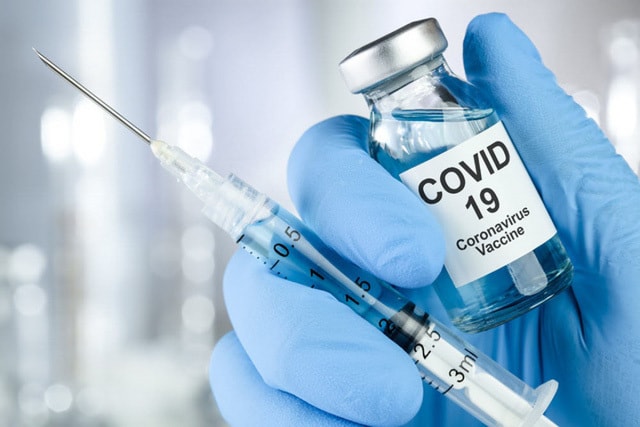What should parents pay attention to when vaccinating children against Covid-19?
“Depending on each child, there may be different post-vaccination symptoms, lasting 2-3 days. In some cases, symptoms may appear 7-14 days later after Covid-19 vaccination,” Dr. Hien Minh shared.
The Ministry of Health has issued a document on the matter.Covid-19 vaccinationfor children aged 12-17. The Ministry said that Vietnam will expand the vaccination target for children aged 12-17 according to the roadmap from older to younger ages, according to the progress of vaccine supply and the local epidemic situation.
Regarding this issue, Dr. Nguyen Hien Minh - Deputy Head of the Vaccination Unit of the University of Medicine and Pharmacy Hospital, Ho Chi Minh City, gave some notes before and after vaccinating children aged 12-17 against Covid-19.
According to Dr. Nguyen Hien Minh, parents should not arbitrarily stop taking medication for children who are being treated for chronic diseases. Bring prescriptions and medical records (if any) for the doctor to screen and vaccinate to consider prescribing the appropriate Covid-19 vaccine. At the same time, do not delay other vaccination schedules that the child is receiving, and bring the child's vaccination records of other vaccines when coming to get the Covid-19 vaccine.
In addition, doctors note that it is not necessary for girls to postpone vaccination during their menstrual period, unless they have severe abdominal pain, vomiting, fatigue and fever.
Before the vaccination day, families should let their children rest and go to bed early. Parents should explain to their children about the Covid-19 vaccination, creating a relaxed and comfortable atmosphere for them. Parents can also give their children a light meal 1 hour before the vaccination to avoid waiting too long and making them hungry. Children can take multivitamin or vitamin C effervescent tablets (after meals) before the vaccination.
 |
| Families should stay with their children 24/7, at least for the first 3 days after Covid-19 vaccination, to promptly detect dangerous signs after vaccination. |
“Drinking plenty of water on the day of vaccination can help reduce fever in children. Parents should dress their children in comfortable, loose clothing when getting vaccinated. If there are no other vaccines to be given on the same day, the Covid-19 vaccine should be given on the non-dominant hand (for example, right-handed children should be vaccinated on the left hand) to reduce difficulties in children's learning activities due to pain and fatigue in the arm after vaccination. Note that do not leave the bandage on the injection site for too long. After 30 minutes, you can help the child remove it,” Dr. Hien Minh advised.
In addition, observe your child's health for at least 30 minutes after the injection at the vaccination site. You should tell your child that if he or she has any uncomfortable symptoms, he or she should immediately notify his or her parents or a medical staff member. After that, parents should let the child go home to rest immediately, and should not go out or participate in other physical activities on the day of vaccination.
The Deputy Head of the Vaccination Unit at the University of Medicine and Pharmacy Hospital in Ho Chi Minh City also gave some notes on caring for children after receiving the Covid-19 vaccine. That is, parents or family members should be with the child 24/7, at least for the first 3 days after vaccination to promptly detect dangerous signs after vaccination.
“Depending on each child, there may be different symptoms after vaccination, lasting 2-3 days. In some cases, symptoms may appear 7-14 days after Covid-19 vaccination,” the doctor shared.
Specifically, at the injection site, the child may experience swelling, redness, pain, small lumps, itching or arm aches. The family should not apply, compress, or cover the painful area with anything (leaves, essential oils, eggs, etc.), but can gently massage the child's arm. Anti-allergy medications should be used under the guidance of a medical professional.
Systemically, children may have fever, fatigue, headache, body aches, nausea. Some children may feel sleepy or hungry more than usual. At the same time, relatives should regularly measure the child's body temperature.
If the fever is below 38.5 degrees Celsius, parents should dress their children in thin, cool clothes but be careful not to catch a cold. Parents should remind their children to drink plenty of water.
If fever is 38.5 degrees Celsius or higher or there is severe pain and swelling at the injection site, use the medicine for children 12-17 years old: 1 tablet x 3-4 times/day Paracetamol 500mg (market name Panadol, Hapacol, Tylenol, Efferalgan...).
 |
| How countries are rolling out Covid-19 vaccinations for children. |
In particular, parents should monitor for signs related to complications of myocarditis and pericarditis after mRNA vaccination in children 12-17 years old, especially in boys and after the second dose, usually 2-4 days after vaccination (can also occur as early as 12 hours after vaccination or later).
These are signs of chest pain, a feeling of pressure or discomfort in the chest, shortness of breath, difficulty breathing, a feeling of an abnormally fast or slow heartbeat, irregular or pounding heartbeat, or palpitations.
“You should take your child to the nearest medical facility immediately if he or she complains of the above symptoms. Parents should not be too worried because most cases of acute myocarditis and pericarditis are very rare after Covid-19 vaccination, are quite benign and will usually recover quickly. Do not feed your child foods that he or she has ever been allergic to (to any degree) for at least 2 weeks after vaccination,” Dr. Hien Minh emphasized.

